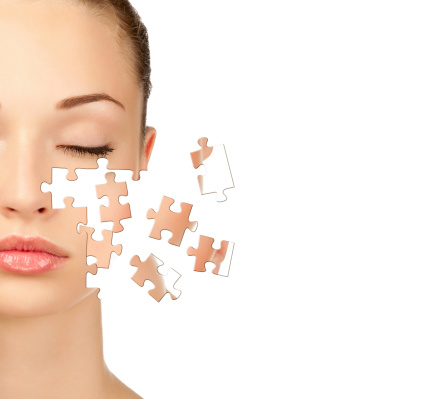
Skin Disorders and Psychodermatology
Common conditions categorized as skin disorders include dermatitis and other itch-related conditions, acne, psoriasis and other conditions that produce unusual skin scaling, ringworm and other fungal infections, and rashes and other disorders characterized by inflammation or unusual skin sensitivity. Other well-known skin-related disorders include cellulitis and other bacterial infections, scabies and other parasitic infections, vitiligo and other pigmentation disorders, moles and other non-malignant growths, and various forms of skin cancer. Doctors also typically include nail disorders, hair follicle disorders and sweat gland disorders in the general skin disorders category. Specific skin conditions known for their interconnection with issues of mental health include acne, psoriasis, atopic dermatitis, herpes simplex, seborrhea (seborrheic dermatitis), an itching disorder called pruritus, a form of excessive sweating called hyperhidrosis, and hives (known more formally as urticaria).
Mental Disorders and Psychodermatology
Several mental disorders prominently feature some sort of skin disruption or destruction in their list of potential symptoms. Well-known examples of these disorders include anorexia nervosa and bulimia nervosa, obsessive-compulsive disorder (OCD), an OCD-related condition called body dysmorphic disorder, various forms of anxiety-related states called specific phobias, an OCD-related condition called excoriation (skin-picking) disorder and an OCD-related hair-pulling disorder called trichotillomania. Additional examples include a lesion-producing condition called psychogenic purpura, a psychotic illness called delusions of parasitosis, and a form of self-injury called dermatitis artefacta.
Common Causes
The connection point between mental health disorders and skin disorders is apparently alteration in the normal function of the body’s immune system. Under the influence of unusual stress or accumulated everyday stress, the body significantly changes the normal function of its nervous system, as well as its normal output of key chemicals called hormones and neurotransmitters. In affected individuals, abnormal levels of neurotransmitters and hormones eventually disrupt the body’s immune function and lay the groundwork for various types of skin disorders. At the same time, ongoing stress reactions in the body and brain significantly increase the risks for the onset of some sort of diagnosable mental disorder. Some people affected by mental disorders don’t develop skin problems as a direct result of those disorders’ effects on brain and body function. Instead, they develop skin problems as a result of taking certain medications designed to ease the effects of their mental disorders. Medications known for their potential to cause a range of skin disorders include antidepressants called tricyclic antidepressants, antidepressants called SSRIs, various substances classified as anti-anxiety drugs, various substances classified as antipsychotic drugs, sedative drugs called barbiturates, anti-seizure medications, and the bipolar disorder medication called lithium. No one knows for sure if the medications commonly used to treat skin disorders can produce secondary mental health side effects. However, one potential culprit has been identified: a medication for heavy, treatment-resistant acne called isotretinoin. Some studies point toward a connection between the use of this medication and increased risks for developing some form of depression and/or suicidal thoughts and behaviors. However, further studies must be conducted before anyone knows if isotretinoin use actually causes these problems or merely appears with unexpected frequency in people who develop these problems.
Making a Diagnosis
The concept of psychodermatological disease is fairly new, and doctors have no set framework for describing all of the possible interconnected effects of skin disorders and mental disorders. However, they can rely upon established medical practices when making a detailed diagnosis. In the case of mental disorders with a skin-related component, mental health professionals can simply look for the telltale signs of skin damage associated with each individual condition. In the case of skin disorders with a mental health-related component, an appropriate diagnosis typically relies on a balance between such factors as psychological and physical stresses in a patient’s life, readily apparent changes in normal mood or behavior, and a rapport between the doctor and his or her patient that supports the discovery of any hidden or secondary psychological factors affecting that patient’s skin condition.
